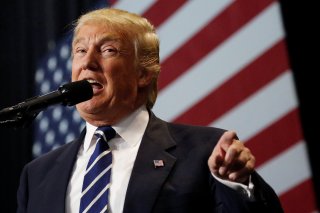$908 Billion in Coronavirus Stimulus Is Possible. But No $1,200 Checks?
Some economists have balked at funneling direct payments into households purely based on income, suggesting that Congress should focus on sectors of the economy that are under the most financial turmoil.
With record surges in coronavirus cases and hospitalizations and a seven-day daily death count average of more than twenty-one hundred Americans—a level that hasn’t been hit since the pandemic’s peak in April—Congress faces massive pressure to swiftly pass a relief bill after a months-long partisan deadlock that let most previous aid expire.
The most recent proposal for a relief package comes from a group of bipartisan lawmakers who drafted a $908 billion bill that’s set to be released Monday. The efforts prove progress for Capitol Hill, as top congressional Democrats announced their support for the proposal last week and Senate Majority Leader Mitch McConnell (R-Ky.) reportedly expressed interest in it.
Although the legislation pumps federal funds into drowning small businesses and state and local governments, the bipartisan framework does not offer another round of $1,200 stimulus checks that was initiated in the Cares Act in March, according to several lawmakers involved in the compromise plan that closed negotiations over the weekend.
“The $1,200 check, it cost we believe nationally $300 billion to give you an idea,” Sen. Dick Durbin (D-Ill.), a member who helped craft the legislation, said on ABC’s This Week. “The Democrats have always wanted a larger number, but we were told we couldn’t get anything through the Republicans, except this $900 billion level.”
Durbin, the number two Democrat, noted that he and colleagues on his side of the aisle had to omit the direct payments to reach agreements with Republicans on issues that need immediate federal help like small businesses and renters assistance.
Sen. Bill Cassidy (R-La.), another congressman who helped with the early stages of the bipartisan framework, argued to “Fox News Sunday” that the bill is “something for the next three to four months to help those in greatest need,” but stimulus checks might be an issue to consider in future packages.
Cash payments were advocated for by most Americans, as the Cares Act provided up to $1,200 for individuals, $2,400 for married couples and $500 per dependent, which was determined by household income.
Sen. Bernie Sanders (I-Vt.) and Rep. Alexandria Ocasio-Cortez (D-N.Y.) announced opposition to the package, citing that excluding the stimulus checks—which is a liberal priority—is a major source for the resistance.
“Tens of millions of Americans living in desperation today would receive absolutely no financial help from this proposal. That is not acceptable,” Sanders said in a statement last week, adding that the elimination of the direct payments is “unacceptable.”
Some experts said that there is a need for additional stimulus checks in an upcoming package but noted, “something is better than nothing,” according to Ambassador Norman Eisen, a senior fellow in Governance Studies at The Brookings Institution.
“The painful lesson of history is that dramatic government spending works to cushion economic shocks like the pandemic,” Eisen said in an interview via email. “The GOP's failure to embrace a full measure of additional stimulus is unconscionable. Nevertheless, politics is the art of the possible and something is better than nothing, although more would be better still.”
The legislation does include $300 weekly jobless benefits that would last through March; a continuation of a temporary pause in student loan payments; an eviction moratorium; billions of dollars in aid for small businesses, restaurants and theaters through the Paycheck Protection Program; and extended unemployment programs for gig workers. Finally, the proposal also offers $16 billion for coronavirus vaccine distribution, testing and tracing.
Eisen added that the stimulus “will likely have a beneficial effect, just not as vibrant a one as is needed if stimulus checks are not included.”
But some economists balked at funneling direct payments into households purely based on income, suggesting that Congress should focus on sectors of the economy that are under the most financial turmoil.
“Congress must exclusively focus on helping those who have been impacted through the crisis. With vaccines coming, and with a growing likelihood that the pandemic will be under control by mid-2021, a laser focus on just helping those impacted without wasting money on unhelpful stimulus programs is even more important,” Wayne Winegarden, an economist and senior fellow Business and Economics at the Pacific Research Institute, said in an interview via email.
Winegarden argued, “stimulus payments based on income are not helpful, and Americans are better off if these payments are not included in the stimulus package,” citing that checks sent out in April boosted the country’s personal savings rate, not only due to households being “concerned” about the pandemic, but also “because workers who did not lose their job did not need these checks to cover basic necessities.”
The package would also be connected to a colossal year-end spending bill needed to dodge a government shutdown this weekend. With Congress slated to take recess in December, the debate regarding another round of stimulus checks will likely be pushed on presumptive President-elect Joe Biden’s White House team after Jan. 20 when new lawmakers take on the Hill.
If the bill fails and Congress doesn’t approve of more federal aid, then an estimated twelve million Americans will lose their unemployment benefits by the end of the year, more businesses will likely shutter and millions of renters will face eviction struggles, forcing poverty to jump.
Rachel Bucchino is a reporter at the National Interest. Her work has appeared in The Washington Post, U.S. News & World Report and The Hill.
Image: Reuters

